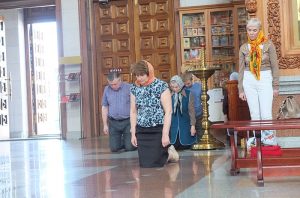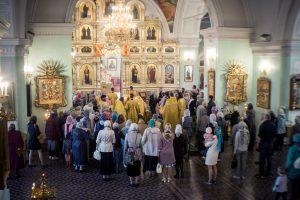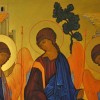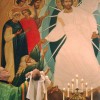Easter is the high point of the Christian year. Lots and lots of folks get dressed up; they go participate in some sort of worship experience, and congregations just go all out: they have sunrise services and multimedia presentations and Easter egg hunts; they have lilies and banners and special music. It’s a wonderful day, and it’s all about the resurrection of Christ Jesus.
But then it’s over. There’s this big, one-day, go-for-broke celebration, and then everything just settles down until Easter rolls around again next year.
But if you think about it, that’s a little strange: I mean, we Christians have just celebrated what we believe is the one, central transforming fact of human history – Christ Jesus was dead, and now he is alive. You would think that would change everything; you would think that the whole world would be different; at the very least, you would think that the celebration of that event would last longer than one day.
Now, in the early church, the celebration of Easter did last more than one day. In fact, back then, the celebration of Easter was something that continued each and every Sunday throughout the year. Those early Christians were absolutely convinced that the resurrection of Christ Jesus had re-formatted the basic structure of the universe, so they made each and every Sunday a celebration of that new reality.
For example, in the early church, it was common to speak of Sunday as the Eighth Day. What that means is that Sunday is a day beyond time; it is a day that has been forever transformed by the resurrection of Christ Jesus; it is the first day of the kingdom, the dawn of eternity. The first Christians expressed that idea – they lived that experience of the Eighth Day – by celebrating the resurrection on every single Sunday. They read the resurrection stories in Holy Scripture, and they sang hymns about the resurrection week after week after week.
But, of course, that’s not something Christians do anymore. Easter Sunday is still the Day of Resurrection, but the other 51 Sundays of the year now have different themes. Christians have borrowed some of these themes from our culture. For example, Mother’s Day is a big Sunday in a lot of congregations; many other communities will honor veterans on the Sunday closest to Memorial Day; lots of congregations are even starting to structure services around Super Bowl Sunday.
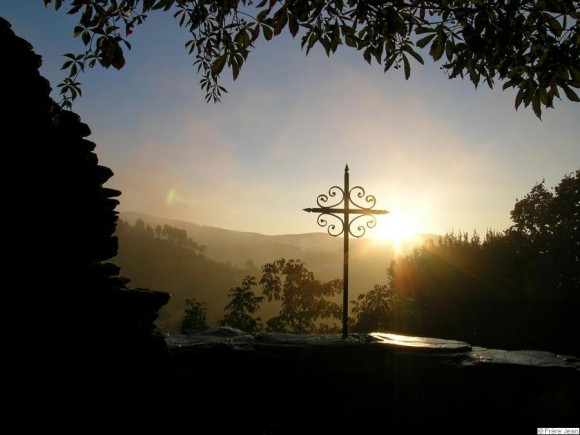
Photo by Hieromonk Herasim Gascuel, www.pravmir.ru
But these Sunday themes aren’t always on loan from our culture. A lot of congregations and denominations generate these themes in-house. You know, communities will recognize graduating seniors on a particular Sunday, or they will use a Sunday to highlight a mission program or a budget campaign. Denominations will often encourage congregations to set aside several Sundays a year in order to emphasize particular social justice issues.
Now there’s nothing at all wrong with any of those themes. It’s great to have special days for moms and veterans and high school seniors; mission work is really important; so are budget campaigns – and, shoot, who wants to argue against social justice or the Super Bowl?
But here’s the thing: None of those themes really has anything to do with the resurrection – and the resurrection of Christ Jesus is what Sunday is all about.
It’s why the early Christians chose Sunday as their day of worship. They didn’t say, “Hey just about everyone gets off work on Sunday! Why don’t we have our worship services on that day?” They didn’t say that because Sunday wasn’t a holiday until the early fourth century. No, those first Christians chose Sunday because that’s the day when Christ Jesus rose from the dead, and they knew something that most of us have now forgotten: they knew that the resurrection has changed this cosmos in some basic and fundamental ways.
But wouldn’t it be boring just to celebrate the resurrection 52 times a year? Wouldn’t it just get routine? Wouldn’t the resurrection of Christ Jesus cease to be special if you read about it and sang about it Sunday after Sunday after Sunday?
Actually, I can answer that question. You see, in Holy Orthodoxy, we still follow that ancient tradition of celebrating the resurrection each and every Sunday. That’s right. We listen to the passages of Holy Scripture which describe the resurrection, and we sing hymns about the resurrection each and every week.
But it is anything but boring; it is never just the same old thing. How could it be? Christ Jesus has risen from the dead, and that fact transforms every other fact – and the more I celebrate that fact, the more I live out of that fact, the more it transforms me. And the more I am transformed, the more I begin to actually live in that Eighth Day, the day which is beyond this world, the day which already shines with the light of eternity.













